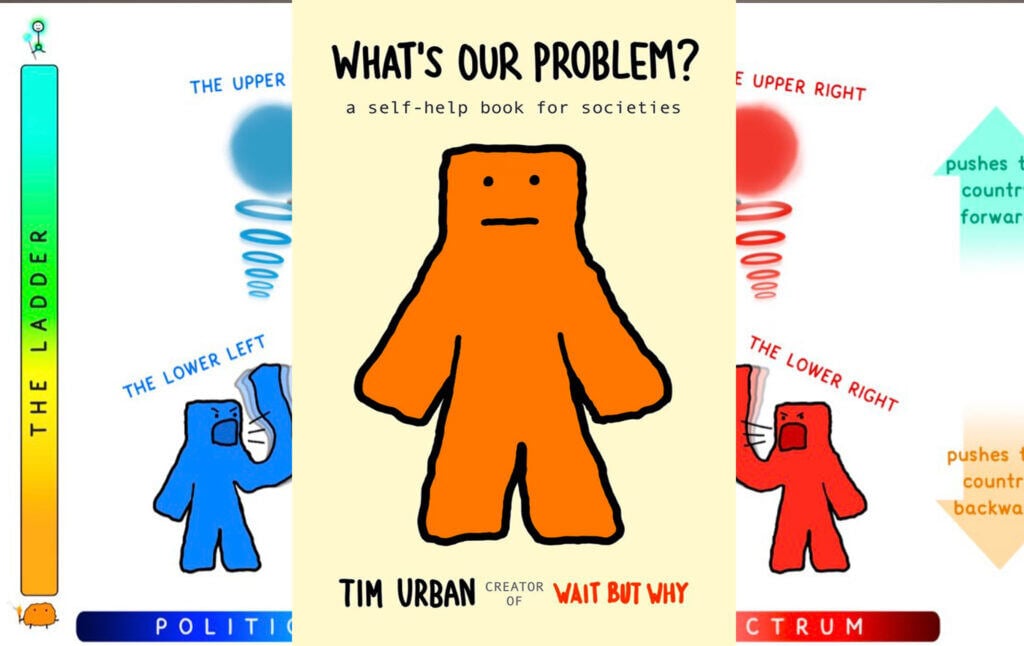
Why Centrism Is Morally Indefensible
Tim Urban’s new book shows how centrists care more about civility than justice, and hate ‘social justice fundamentalism’ more than plutocracy.
Tim Urban is a blogger known for his website “Wait But Why,” which mixes (deliberately poor quality) drawings with text to explain subjects from artificial intelligence to procrastination. Urban’s blog was quite popular, and he did a TED talk that racked up 50 million views, but six years ago he stopped updating his site to go and work on a book. That book, What’s Our Problem?: A Self-Help Book For Societies, has now been published. It is over 700 pages long, has been endorsed by Elon Musk, and to hear Urban tell it, writing the book consumed his life. What began as another explainer post spiraled into a comprehensive treatise on the nature of human society that aims to conclusively diagnose the ills facing our species and propose remedies. Urban, who worked on this from age 35 to age 41, believes he has produced a magnum opus, “a new framework for thinking about our complex political environment,” “a new perspective on the world, on politics, on group dynamics, on how we think and why we believe the things we believe.”
What did Urban come up with after six years of reflection and research? What is the grand new Perspective On Everything that he presents over the course of 121,000 words and 300 of his signature scribbly drawings? Well, I don’t think it’s oversimplifying things too much to say that the core idea is that People Should Be More Reasonable, and that we need a sensible centrist politics that rejects the Tribalistic Extremism of both left and right. Urban is particularly concerned that leftist movements for social justice are wrecking the foundations of the civilized order. If you want to locate him politically, I think Urban roughly shares the viewpoints of Bill Maher and Joe Rogan, both of whom reject left-right labels but spend a lot of time whining about Wokeness.
You don’t need to look at 300 of Urban’s drawings to get the basics of his thesis. This one is quite enough:
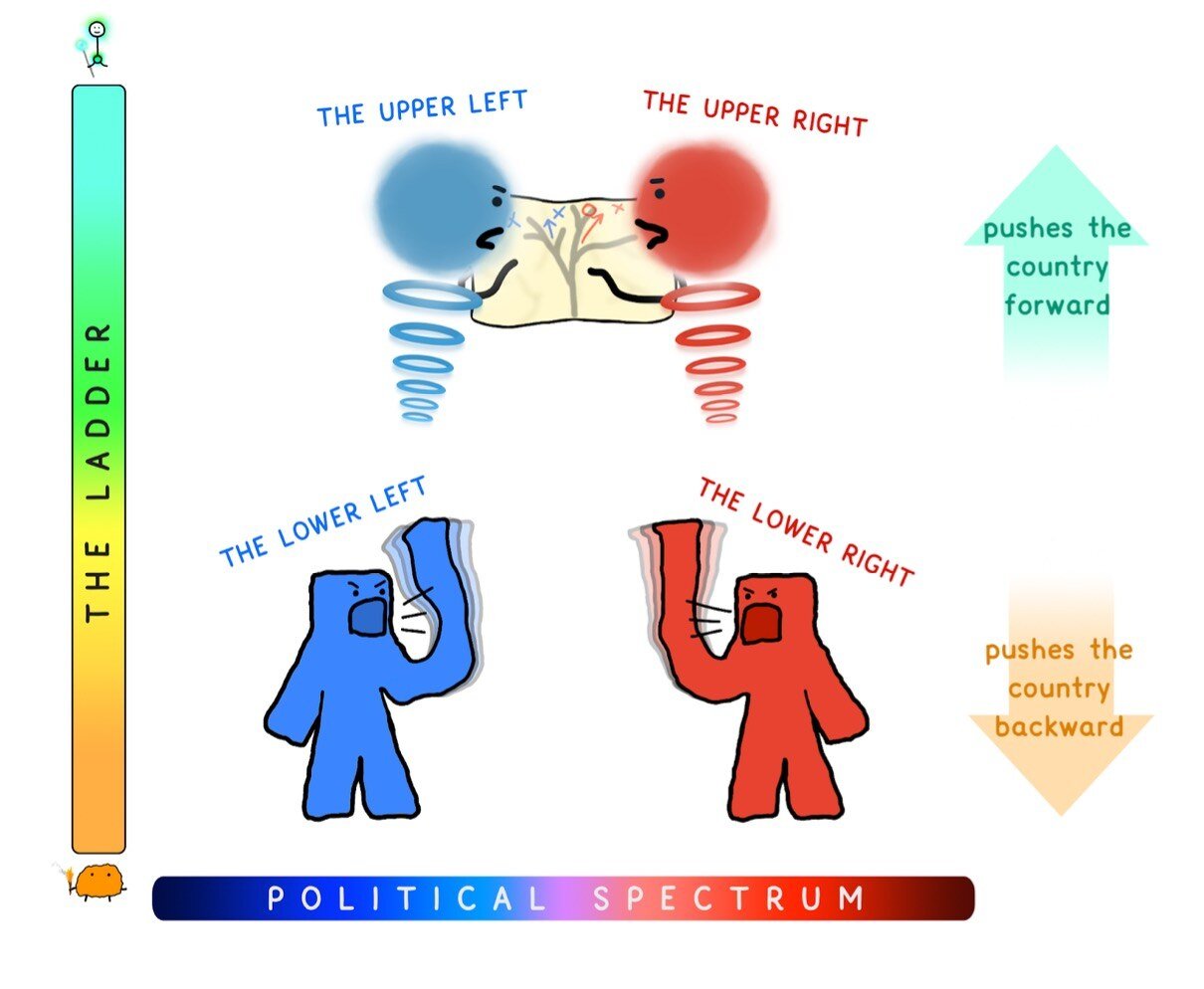
As you can see, Urban believes there is a ladder of intellectual sophistication, with people using their Neolithic, emotion-driven dumb-person brains at the bottom of the ladder, and their rational, thoughtful brains at the top. There are dumb, angry people on the left and right who just want to whack each other with clubs. These people are violently partisan and tribal, and they push the country backward. Then there are the elevated, intellectual ones who have spirited debates that move us all forward:
The Higher Mind is the part of you that can think outside itself and self-reflect and get wiser with experience. Unlike the Primitive Mind, the Higher Mind can look around and see the world for what it really is. It can see that you live in an advanced civilization and it wants to think and behave accordingly.
Urban calls this “ladder” “a thinking lens—a pair of glasses for the brain to help us better understand the world.” For him, it shows us that there are two factions in the contemporary U.S. who pose “an existential risk to liberal societies”: one is extremist Trumpian Republicans (who are discussed in one chapter) and the other is Social Justice Fundamentalists (who are discussed over the course of three chapters). Both are guilty of subscribing to a view of politics Urban calls “Political Disney World,” where there are Good versus Evil struggles with unambiguously correct heroes and unambiguously fiendish villains.
The problem with American politics, Urban says, is not that people hold left- or right-wing beliefs, but that sometimes they operate on the “lower rungs” of his ladder, demonizing each other and behaving irrationally. As he says:
I mistakenly thought that what I objected to was “the Right.” But the Right wasn’t the problem. The problem was the Lower Right. The problem wasn’t too much conservatism, it was too little conservatism. I hadn’t understood that high-rung conservatism is a critical part of a healthy country and that the Republican Party I knew was actually depriving my country of it.
To illustrate the difference between the Bad Right and the Good Right, Urban cites the difference between Barry Goldwater and Ronald Reagan:
Finally, while Goldwater had spoken in the divisive language of Political Disney World, Reagan usually spoke to Americans’ Higher Minds. His speeches were inclusive and emphasized common humanity, with lofty proclamations that all Americans were “bound together in that community of shared values of family, work, neighborhood, peace, and freedom” and convictions that “I know in my heart that man is good, that what is right will always eventually triumph, and there’s purpose and worth to each and every life.”
Urban acknowledges that Reagan was a hard-right idealogue in many ways. Nevertheless, his rhetoric about “shared values” meant that he was not a proponent of the base and destructive tribalism that Urban believes is the core problem with society. “Reagan typically governed the high-rung way: steadfast about principles but flexible about policies.” “High-rung political thinkers,” he says, “ work hard to avoid falling into the tribal mindset and try to maintain a balance of empathy and criticism when dealing with people on other parts of the political spectrum.” On the other hand, what Urban calls “social justice fundamentalism” (SJF) is a serious threat to us all:
From every angle, SJF is a complete and utter departure from open-minded progressivism. It is highly authoritarian, laying down rules about how to speak, how to think, how to teach, how to hire. It doles out severe penalties for minor infractions. It’s the opposite of diverse and inclusive, enforcing strict conformity. It’s vindictive and promotes medieval-style public shaming campaigns. It assumes the worst about people’s intentions. Social Justice Fundamentalism is bad for those who are canceled by it, for those who are silenced by it, for kids and employees indoctrinated by it, for those affected by its illiberal policies, and for everyone relying on the core values of companies and institutions across the country.
Urban draws a Trojan Horse, saying that “the Social Justice horse that SJF rides around in talks about noble-sounding things like diversity, inclusion, justice, and safety. But inside the Social Justice Horse are all kinds of low-rung, illiberal things like tribalism, bullying, bigotry, censorship, witch-hunting, anti-intellectualism, discrimination, and hypocrisy. All the signs of a big, lumbering golem.”
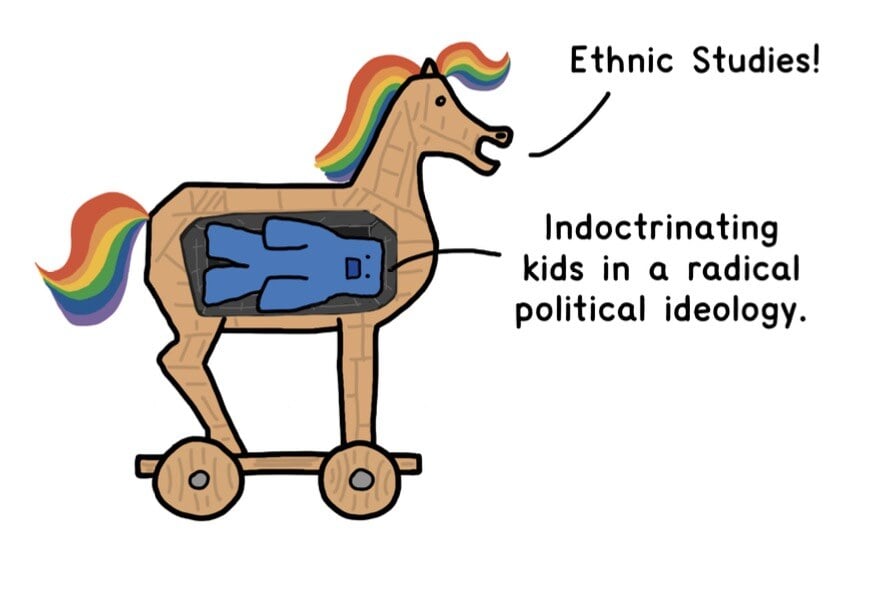
Social Justice Fundamentalism, Urban writes, will take us down a slippery slope he calls the “illiberal staircase” of progressively more “dictatorship-y” things:
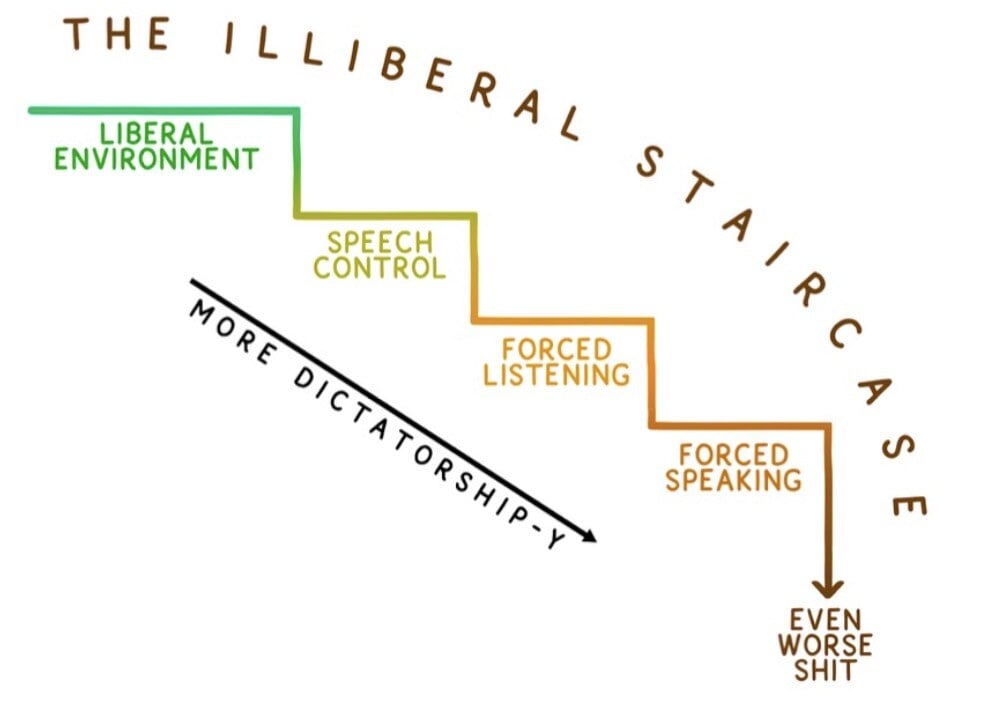
He believes that postmodernism, which is part of the intellectual basis of this fundamentalism, is attacking the very foundations of modernity, which he illustrates with this pyramid:
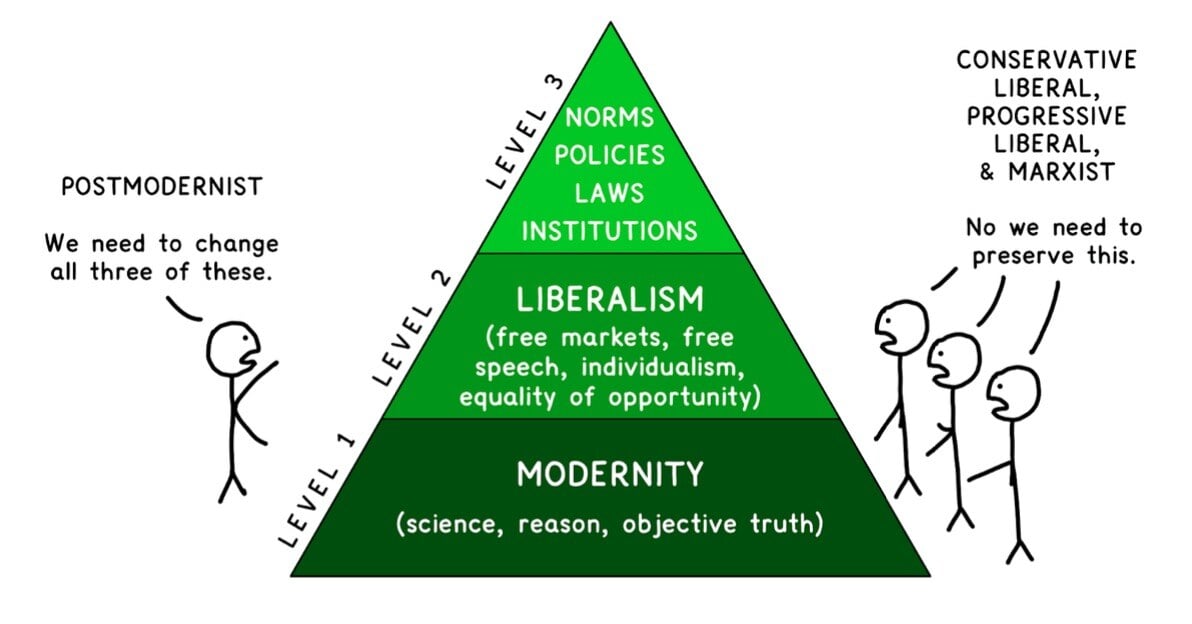
Urban says that the country’s major institutions all now subscribe to Social Justice Fundamentalism (SJF), which he illustrates thusly:
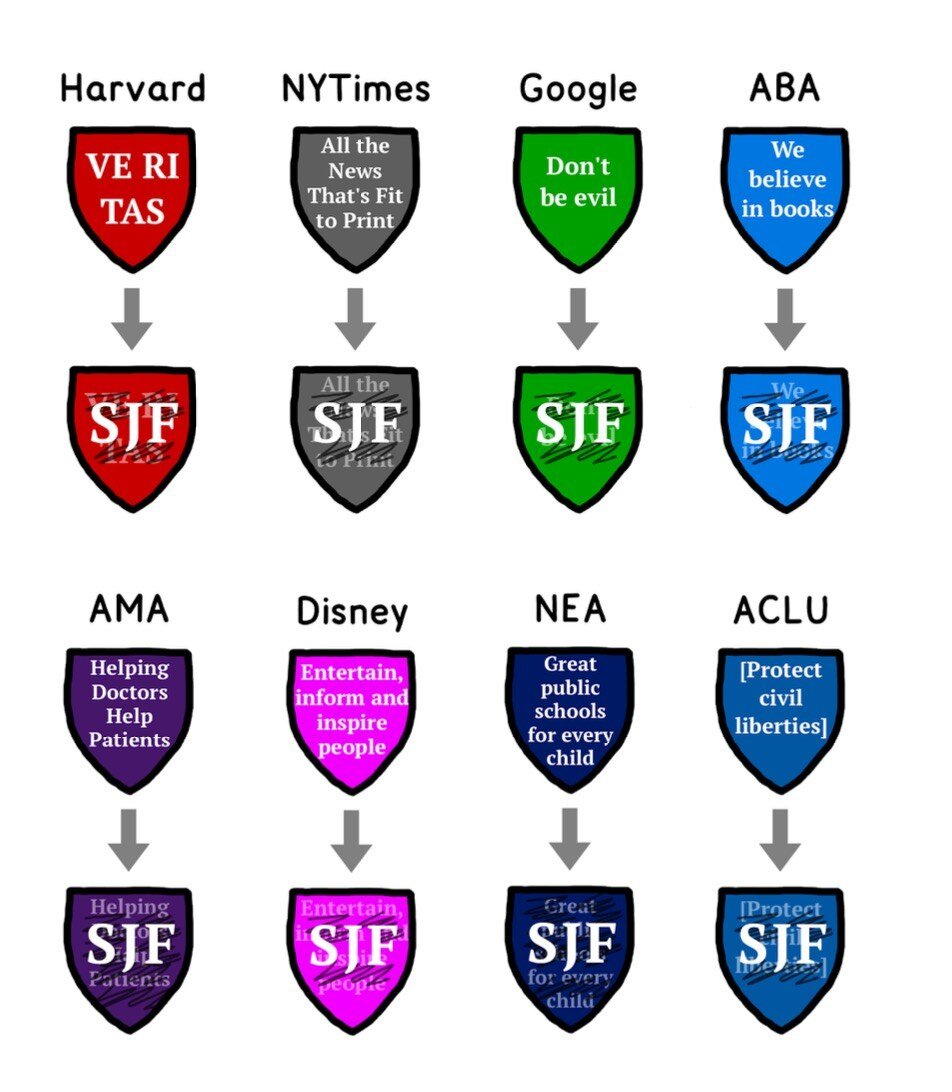
To support this thesis of a creeping LGBT Trojan Horse of authoritarianism, Urban cites the usual parade of examples of Wokeism Gone Mad, from Charles Murray’s 2017 Middlebury College fracas to the protests against Bret Weinstein at Evergreen State when he made a stink about the college’s “Day of Absence” event. To support the charge that Google has gone “Social Justice Fundamentalist,” Urban cites the firing of the “memo guy,” James Damore, who was dismissed from the company after circulating a document filled with comments like “when a man complains about a gender issue affecting men, he’s labeled as a misogynist and a whiner” and “nearly every difference between men and women is interpreted as a form of women’s oppression.”
I’ve spent years addressing complaints like Urban’s about Social Justice, and I don’t want to repeat myself yet again here. (You can pick up my old book The Current Affairs Rules for Life ,which debunks a lot of claims like Urban’s, or my new book, Responding to the Right, which addresses more of them.) I find all of this stuff about the authoritarianism and dictatorship of the social justice left to be ludicrously overstated and hyperbolic. I find that people like Urban, who present themselves as voices of cool reason in a country gone mad, actually seem conspiratorial and paranoid (Trojan horses! Every institution captured by ideology!) When we adopt an empathetic approach to social justice activists, rather than the kind of hysterical overstatement typical of Jordan Peteson, it seems to me that a better way of framing it is that sometimes in the name of good values like antiracism and LGBTQ+ inclusion, people overcorrect and end up doing things that are themselves unfair. (For instance, I generally don’t like it when people get fired for speech stuff and think it would be far better to have a process within the workplace that works through the conflict productively.)
Urban does put some events in the “cancel culture” bucket that I don’t think belong there. He cites, for instance, the New York Times op-ed editor resigning under pressure after publishing a piece by a far-right senator calling for cracking down on Black Lives Matter protests with military force. I think it’s perfectly fair to say that not all points of view are entitled to an airing in the New York Times. The editor’s defense of the decision to publish the op-ed was dishonest, and I’m glad he was replaced. (He went to work at The Economist instead, showing that even those who suffer the worst “cancelations” usually end up fine.) Urban also cites the canceling of Robert Zoellick’s commencement address at Swarthmore College. Zoellick had served as deputy secretary of state under George W. Bush. I think this was a perfectly reasonable cancelation, too. Swarthmore was founded by Quakers, and Zoellick supported the worst war crime of the 21st century, the war on Iraq. Why on Earth did he deserve the honor of being a commencement speaker?

But while I could go through all of Urban’s overstatements and bad arguments about social justice (he does the maddening “the gender wage gap isn’t real” thing that I refute in Responding to the Right), I’m more interested in the focus of this book. Remember, Urban went off for six years to research and think and write, and to come up with a comprehensive theory of what society’s deepest problems are and how we ought to solve them. And the answer he came up with is that angry people in politics are the problem, with “social justice fundamentalism” being the problem he devotes more time to than any other.
To which I can only say: have you looked around you lately? Urban writes a 700-page book on politics, filled with citations to current events, without considering the problems of nuclear proliferation, the climate crisis, the decimation of Earth’s biodiversity, animal farming, global wealth inequality, plutocracy, exploitation in the workplace, medical bankruptcy, opioid deaths, police brutality, homelessness, mass incarceration, COVID, unaffordable housing, student debt, or voter suppression. How out of touch with the basic facts of the world do you have to be to think that ethnic studies programs merit more attention than all of these colossal problems facing humanity? The title of Urban’s book is literally What’s Our Problem? Somehow the answer he comes up with isn’t, “We’re moving aggressively toward World War III and billions of people live in preventable misery.” It’s, “American politics are too tribal and people are rude to each other, plus those woke people are The Real Authoritarians (even though they don’t put anyone in prison and are often prison abolitionists).
I think Urban is grossly unfair to the social justice movements he spends chapter after chapter attacking in the book, and it’s obvious he’s a hypocrite who doesn’t practice his professed values of empathy and self-criticism. The book drips with arrogant certitude. But more importantly, I’m horrified that someone exists who could be this oblivious toward all the actual problems that people face in the world we live in. Urban clearly lives in a pleasant insular world where the worst problem you might encounter is that you find diversity training talking points with Robin DiAngelo to be really annoying. But what about the world where people go bankrupt because they get sick? What about the children working in factories and fields? What about the migrants in cages? How can you not notice any of that? How can you honestly think that too much Social Justice Activism is what matters? A 700-page treatise about The Problems With Our Society, and not once are the most serious forms of human suffering considered to be important. In fact, Urban makes it clear that he doesn’t really have a stance on that stuff. He says that the tribes in our country have “checklists” about the good stuff and the bad stuff and they go like this:
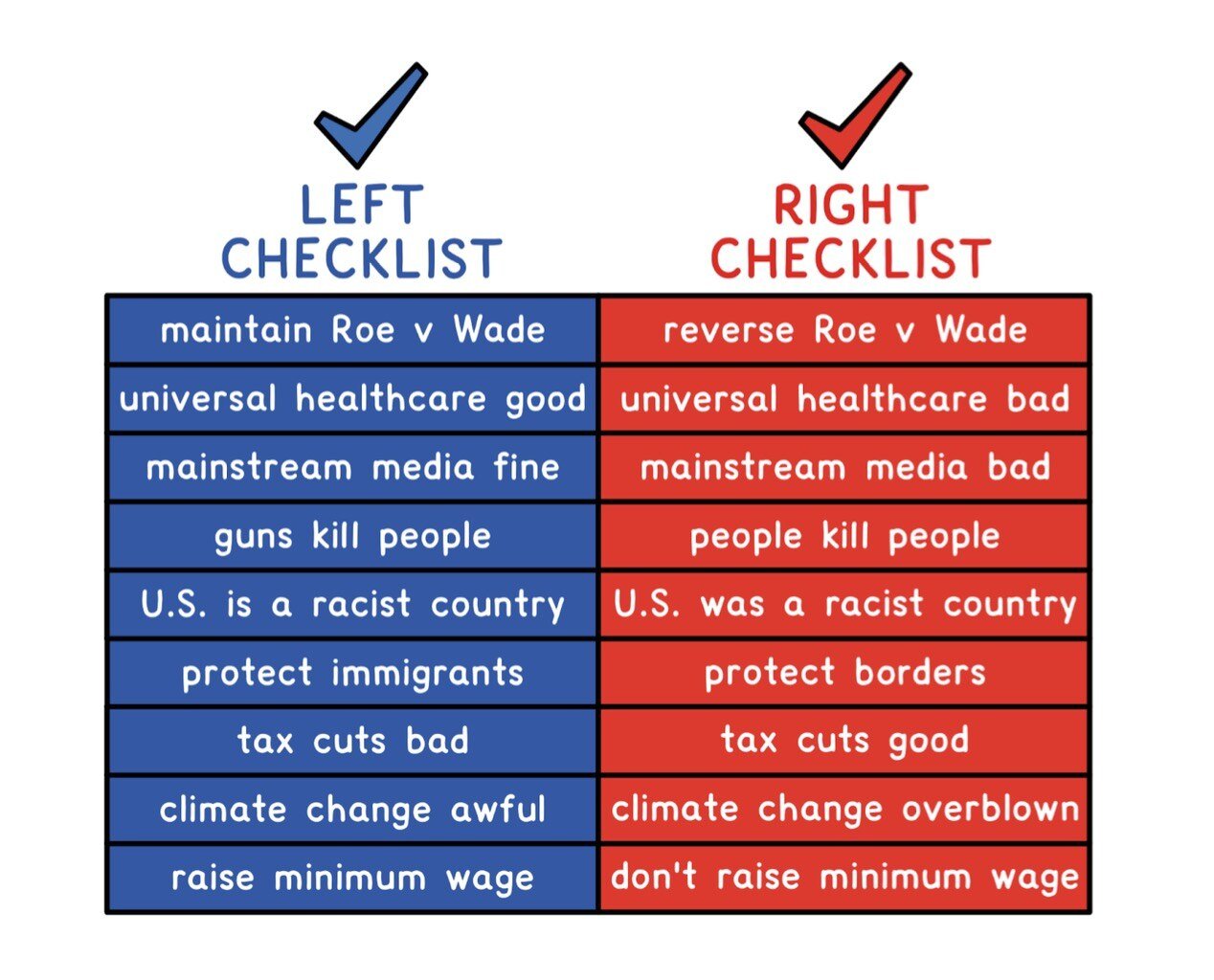
Should we raise the minimum wage? Is universal healthcare good? I don’t know what Urban thinks, but I suspect he doesn’t care, and just thinks that whatever we do, we ought to do it without shouting at each other or calling things fascist.
And here you have the problem with centrists: they won’t call an atrocity an atrocity, because this would be tribal and extreme. They won’t fight to end a horrific injustice, because the very idea of a horrific injustice has no place in their vocabulary. More important than the fact that Ronald Reagan armed death squads is the way he talked, all his bullshit about how we were all in this together (even as he waged a class war). As Martin Luther King Jr. knew, and called out in “Letter from Birmingham Jail,” moderates never get anything done, because they refuse to stand resolutely for anything other than civility and restraint. (Although Urban is not too terribly civil or restrained when denouncing the Social Justice Fundamentalists; so-called moderates and Classical Liberals are actually often just conservatives who would fight harder to stop CRT in schools than to stop Amazon from crushing its union organizers.)

Tim Urban spent six years writing this book. He shouldn’t have bothered. He squandered his time. He produced nothing of any value to anyone who is serious about making the world better. All of the criticisms of Social Justice in here are just rehashed versions of the same tired anti-woke stuff you can find in John McWhorter’s Woke Racism and Pluckrose/Lindsay’s Cynical Theories, albeit with some terrible drawings added. The rest of the book has interest only for what it doesn’t say, i.e., anything about anything that truly matters. I am losing my patience with those who refuse to look at the suffering in the world, who pretend it isn’t there and spend their time complaining that things are getting a little too woke. Haven’t you looked at the stats? All the queer kids in our schools are fucking miserable. Young girls want to kill themselves in record numbers. People can’t afford an emergency medical expense. Climate change has created millions of refugees in Pakistan. Afghanistan is starving because we wrecked the country. Do you not live in the same world that I do? What kind of busted moral compass must one have to spend six years trying to find the most important political ideas on which to opine, and then to produce a massive tract on the Illiberalism of The Left?
Tim Urban, you have wasted years of your life on this. But you don’t have to waste any more of it. Quit doing your little scribbles, forget you wrote this book, and go out and find something to work on that actually matters and makes a real material difference to people suffering hardship. Ditch Civility Centrism and come and be a socialist. Leave this tired debate about wokeness behind. We have much more important work to do.




